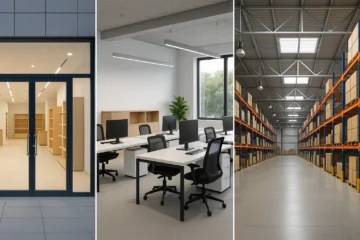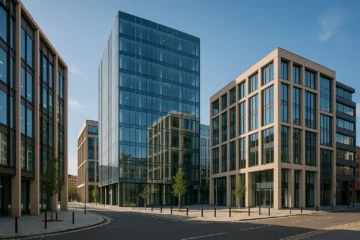1. Introduction
Commercial leasing is the cornerstone of modern business operations, enabling companies
to secure the space they need without the significant upfront costs of property ownership.
From small startups to multinational corporations, leasing provides a flexible solution that
adapts to diverse business requirements. This article explores what commercial leasing
entails, who benefits from it, and how it shapes the commercial real estate market in the
United Kingdom.
2. Understanding Commercial Leasing
Definition
A commercial lease is a legally binding agreement between a landlord and a business
tenant, granting the tenant the right to use a property for commercial purposes in exchange
for rent. This can include offices, retail spaces, warehouses, coworking environments, or
industrial units.
Types of Commercial Properties
- Offices: Ranging from small suites to entire buildings.
- Retail Spaces: Including shops, shopping malls, and showrooms.
- Warehouses: Suitable for storage, logistics, and light manufacturing.
- Coworking Spaces: Shared environments tailored for startups, freelancers, and remote teams.
Key Components of a Commercial Lease
- Rent: Monthly or annual payments, often negotiated based on location and amenities.
- Lease Duration: Terms can range from short-term (1-3 years) to long-term (10+ years).
- Responsibilities: Includes maintenance, utilities, and property management obligations.
3. How Commercial Leasing Works
The Leasing Process
- Initial Inquiry: Businesses define their requirements (location, size, budget).
- Property Search: Involves brokers or online platforms to identify suitable properties.
- Negotiation: Key terms such as rent, lease length, and modifications are discussed.
- Legal Formalities: Signing agreements and ensuring compliance with UK property laws.
Roles Involved
- Property Managers: Handle day-to-day operations.
- Brokers: Facilitate the search and negotiation process.
- Landlords: Provide and maintain the leased property.
Legal Considerations
- Compliance with UK commercial lease laws, such as the Landlord and Tenant Act 1954.
- Clarity on terms, including break clauses and repair obligations.
4. Who Can Benefit from Commercial Leasing?
Startups and Small Businesses
Leasing allows them to secure office space with minimal capital, providing flexibility for growth.
Established Corporations
Long-term leases enable corporations to establish a strong presence in prime locations.
Retail Businesses
Retailers benefit from visibility and high foot traffic in strategically located properties.
Freelancers and Entrepreneurs
Coworking spaces offer affordable and adaptable environments without long-term commitments.
5. Advantages of Commercial Leasing
- Cost-Effective: Avoids significant capital investment.
- Flexibility: Adaptable to business growth or downsizing.
- Maintenance Support: Landlords handle major repairs and upkeep.
- Prime Locations: Access to high-demand areas without ownership burdens.
6. Potential Challenges of Commercial Leasing
- Long-Term Commitments: May limit flexibility if business needs change.
- Usage Restrictions: Leases often specify permitted activities.
- Hidden Costs: Additional charges for maintenance, utilities, or property taxes.
7. Trends in Commercial Leasing in the UK
- Rise of Coworking Spaces: Increasing demand for flexible solutions.
- Impact of Remote Work: Shift towards hybrid office models.
- Sustainable Buildings: Growing preference for eco-friendly spaces.
8. Tips for Finding the Right Lease
- Assess Your Needs: Location, size, and amenities.
- Understand Terms: Scrutinize clauses for hidden obligations.
- Seek Expert Advice: Work with brokers or legal professionals.
9. Conclusion
Commercial leasing is a pivotal choice for businesses of all sizes, offering flexibility, scalability, and access to premium locations. By understanding the process and potential pitfalls, businesses can secure leases that align with their goals and operations.
FAQ Section
Q1: What is the typical length of a commercial lease?
Leases in the UK usually range from 3 to 10 years, but flexible options like coworking spaces offer monthly agreements.
Q2: Can a commercial lease be terminated early?
Yes, if the lease includes a break clause, tenants can end the agreement under specific conditions.
Q3: Are coworking spaces considered part of commercial leasing?
Yes, they are a subset of commercial leasing, offering shared and flexible office solutions.
Q4: How is rent determined in commercial leases?
Rent is based on factors such as location, property size, and market demand, often reviewed periodically during the lease term.


